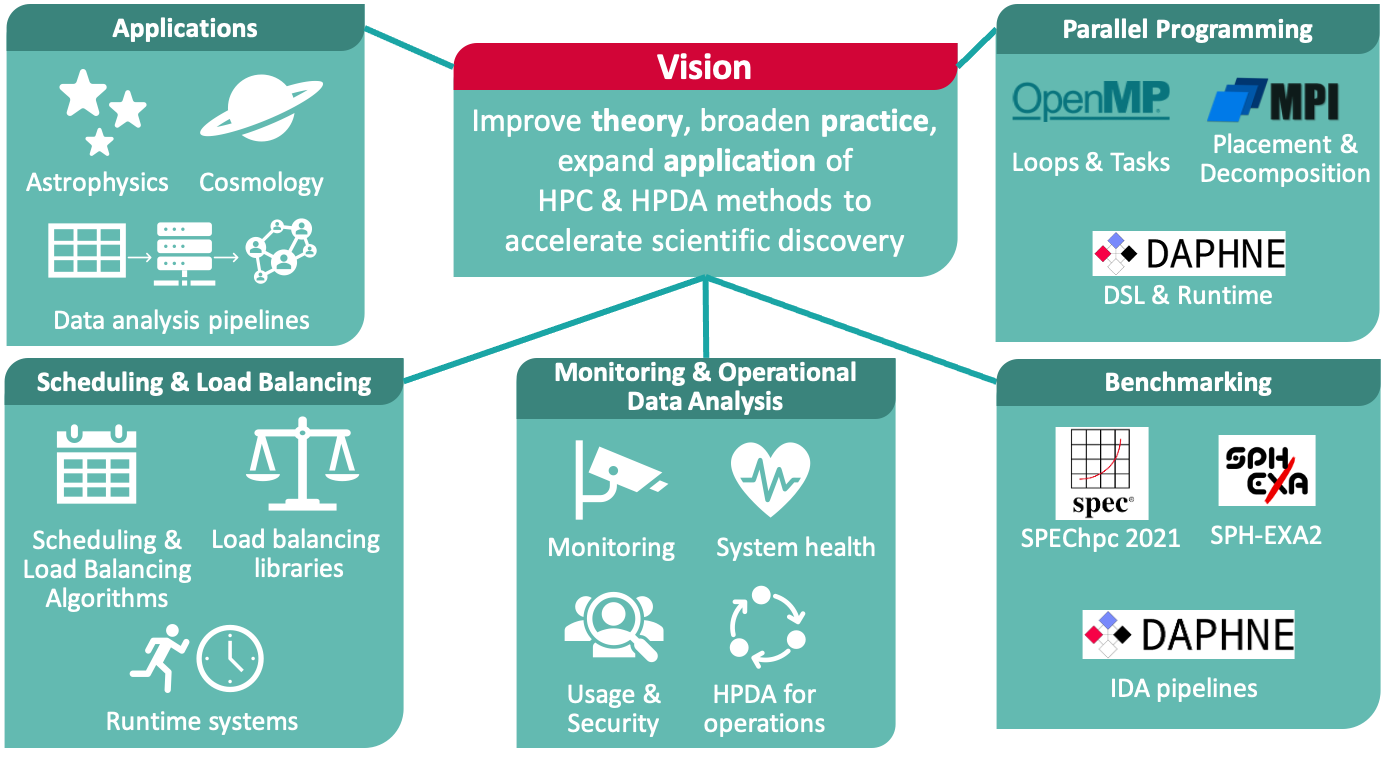RESEARCH ACTIVITIES
The research of the HPC group at the Department of Mathematics and Computer Science of University of Basel, Switzerland conducts advanced and cutting-edge research in performance optimization of parallel and distributed applications and computing systems. Our work spans from small-scale multi/many-core systems to large-scale heterogeneous and multi-node architectures.
Our research addresses the complex interplay between high performance computing (HPC) applications, computing and data center systems and their operations. We focus on optimizing performance, reliability, energy-efficiency, and usability guided by real-world user behavior, system usage patterns and daily operations. Key research areas include:
|
|
Our interdisciplinary approach combines system-level engineering with data-driven methodologies to generate both foundational knowledge and insights and practical solutions in HPC. We actively collaborate with academic, industrial, and international partners to ensure our research has real-world impact. Learn more on our Collaborations page.
RESEARCH PROJECTS
Ongoing scientific research projects
- SKACH: Exascale Sky Simulations for Square Kilometre Array Observatory, funded by The State Secretariat for Education, Research and Innovation (SERI), 01.09.2021-31.12.2028 (External URL, UniBas URL)
- SPH-EXA2: Smoothed Particle Hydrodynamics at Exascale, funded by the Swiss Platform for Advanced Scientific Computing, 01.07.2021-30.06.2024 (External URL, UniBas URL)
- 3BEARS: Broad Bundle of BEnchmARks for Scheduling in HPC, Big Data, and ML, funded by the Swiss Academy of Engineering Sciences (Switzerland) via the Germaine de Staël programme, 01.01.2021-31.12.2022 (URL)
- MODA: Improving HPC operations and research through Monitoring and Operational Data Analytics, funded by the University of Basel, 01.08.2022 – present (URL)
- miniHPC: A modern high-performance computing cluster (15.12.2016-present), a teaching and research platform, funded by the University of Basel (URL)
- µ-Cluster: Everything Parallel (01.03.2017-present), a research and demonstration project, funded by the University of Basel (URL)
Active software projects and tools
-
SPH-EXA: We develop the SPH-EXA mini-app (more details on our Scientific Output page) as a means to enable Exascale-ready hydrodynamic simulations for cosmology and astrophysics
-
LB4OMP: We develop an OpenMP runtime library that extends the LLVM OpenMP runtime library with additional dynamic loop scheduling techniques for OpenMP loops (more details on our Scientific Output page)
-
SimGrid: We extend SimGrid (URL), a scientific instrument to study the behavior of large-scale distributed systems (Grids, Clouds, HPC, or P2P systems) with dynamic load balancing methods to optimize application performance (more details on our Scientific Output page)
-
HAEC-SIM: We use HAEC-SIM (URL), a simulator for highly adaptive energy-efficient computing originally developed at TU Dresden, to study the impact of parallel application placement on performance.
Completed scientific research projects
- DAPHNE: Integrated Data Analysis Pipelines for Large-Scale Data Management, HPC, and Machine Learning, funded by the European Union’s Horizon 2020 research and innovation programme, 01.12.2020-30.11.2024 (URL)
- The DIALOGUE Study: Using digital health to improve care for families with predisposition to hereditary cancer, funded by the Swiss National Science Foundation and the National Research Foundation (NRF) of South Korea, 01.11.2019-31.10.2022 (URL)
- SPH-EXA: Optimizing Smooth Particle Hydrodynamics for Exascale Computing (01.07.2017-30.06.2020), funded by the Swiss Platform for Advanced Scientific Computing (External URL, UniBas URL)
- MLS: Multilevel Scheduling in Large Scale High Performance Computers (01.09.2017-30.04.2021), funded by the Swiss National Science Foundation (URL)
- DA-HPC-OR: Data Analysis for Improving High Performance Computing Operations and Research (01.09.2018-29.02.2020), Seed Money grant funded by the Eucor – The European Campus (External URL, UniBas URL)
Former projects (no longer supported)
-
PROVA! A tool to conduct reproducible research in computational science (URL)

